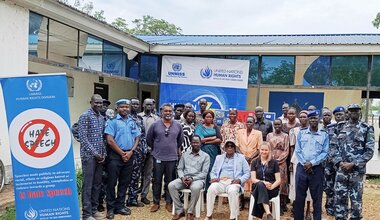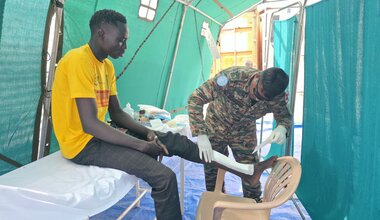Festive UNMISS event in Juba calls for collective soul-searching and action for peace
CENTRAL EQUATORIA – What could be better than enjoying scintillating music, poignant poetry, and hearty laughs in the company of hundreds of happy revellers? Certainly, it would have to be a similar occasion, sprinkled with wholesome messages of peace and unity and insightful updates on the drafting of a permanent constitution and other components of South Sudan’s peace process.
Fortunately for the 350 people who recently showed up at Juba’s Nyakuron Cultural Centre, that is exactly what was on the menu of the day, with The Flamingoes, the in-house band of the United Nations Mission in South Sudan (UNMISS), belting out rousing renditions of every socially conscious song worthy of a place under the sun. There was some serious fun to be had!
Now, this was a day made and intended for a productive marriage of joy and usefulness, with attendees having plenty to say about the current state of affairs of their nation.
“For peace to prevail, we demand more unimpeded participation of women, girls, youth, and people with disabilities, at all levels of governance, to more effectively influence decisions that affect our everyday lives and the prospects of peace,” said Amer Manyok Deng, a women’s representative keen on mobilizing her fellow citizens at the grassroots level.
And reaching out to all and sundry is what this campaign, under the theme “Peace Begins with Me” and undertaken by the peacekeeping mission’s Community Outreach Unit, is about.
An assortment of knowledgeable speakers, including a representative from the Reconstituted Joint Monitoring and Evaluation Commission, addressed the crowd, informing women and men not only about the different steps of the implementation of the revitalized peace agreement but also about the role of UNMISS and the need for inclusivity, transparency, and accountability.
There was even room for some self-criticism, expressed by Stephen Par Kuol, South Sudan’s Minister of Peacebuilding.
“We political leaders should accept that we have done wrong ourselves. We cannot continue blaming one another when our people are dying of hunger, poverty, and disease every day and every night,” the Minister said. Signing peace agreements, he added, is not enough to achieve stability and development, with genuine political will being equally important to obtain results.
The concept of unity was also on the mind of Agook Riak, a Political Affairs Officer serving with UNMISS.
“A new, permanent constitution is vital because it will help lead the people of South Sudan through a smooth democratic process that enables them to decide their own future in free, fair, and credible elections in December 2024,” he said, urging citizens of all ethnicities to rally behind the drafting of the crucial document to ensure that everybody’s voice is heard.
His peacekeeping colleague Hiroko Hirahara, Director of the mission’s Civil Affairs Division, continued along similar lines.
“We are working and advocating for a civic space where diverse opinions are encouraged, accepted, debated and celebrated” she affirmed.
The visions and different aspects of what would constitute a bright future for the country are many, but according to Mary Agok John, a participant at the Nyakuron happening, all of them require peace to be fulfilled.
“Only peace will allow us to produce enough food, have adequate health facilities and give our children the education they need. With such a development, the cost of living will go down, our standard of living will improve, and we’ll be able to further develop our communities,” she said, capturing the sentiments of many a South Sudanese citizen.
 UN
UN United Nations Peacekeeping
United Nations Peacekeeping





